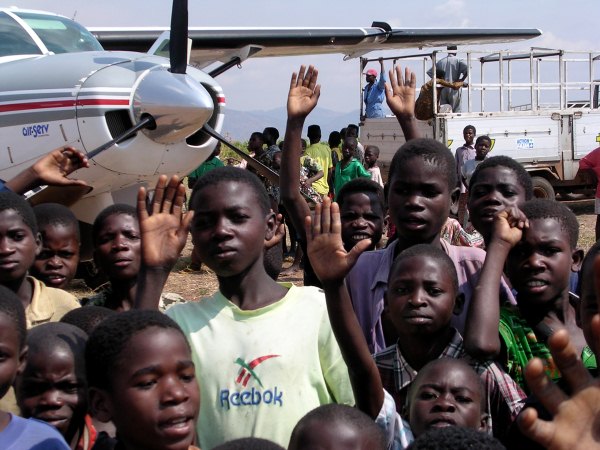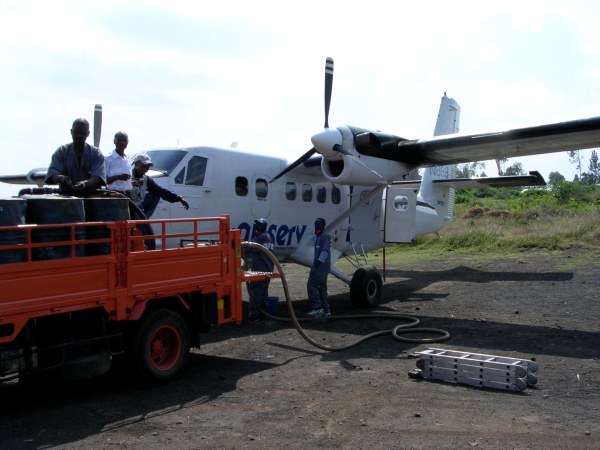Scroll down for the audio interview!
This past summer, with some time on my hands, I headed to Nome. There were a couple of people I’d been wanting to interview for Oddball Pilot. It’s pretty normal to have some down time while waiting for people to make time to sit down for an interview, so I killed time by hanging out at the Era pilot house. I spent much of that time chatting with John Corcoran.
I knew John a little from my old Hageland days. He flew for Cape Smythe and later Frontier Airlines, both Hageland rivals. I can’t say I knew John all that well in those days. But after hanging with him in Nome it seemed silly that I’d let company rivalry get in the way of a friendship. John was a pretty cool guy.
Like me he’d drifted away from Alaska when Frontier and Hageland merged. While I turned to the lower 48 and more climbing, John headed to Africa and a contract flying Let L-410s around central Africa.

A crowd gathers around a humanitarian aid Caravan in the Democratic Republic of Congo
As we talked more about Africa and the Let, I started to think it would be cool to record a conversation and give everyone a chance to hear about John’s experiences in Africa and what it was like to fly this airplane.
The Let L-410 is a Czech-manufactured high wing turboprop that you see all over Africa and Europe. There’s at least one in Mongolia, too. It’s one of those compromise planes. It has good short field performance and is fairly fast at the same time. I’ve always wanted to fly one, so it was great to hear John’s take on the plane.
I also think John’s experience in Africa is a great look at what the work is like for an ex-pat. We get a lot of emails at Oddball Pilot about flying humanitarian aid, and John’s experience is pretty typical.

The flying in Africa is hard work, but unlike many jobs in Alaska, you’re just the pilot. Other people do everything else, including fueling your plane. (And no, that’s not a Let L-410 …)
The company he worked for had several contracts ranging from humanitarian aid to flying for oil companies. Some were humanitarian aid, some were not. That seems pretty standard. You fly the contracts that your company has. There are very few places where all you do is relief work. Airlines have to make a profit and they’ll take whatever work pays. It just happens that humanitarian aid can pay well. Then again, so can flying weapons …
John’s take on the flying scene in Africa is a good, practical reflection on the life of an ex-pat pilot.
In this interview you’ll hear about:
- Why John decided to look for a job flying in Africa (and how long it took him to get one).
- Why employers in Africa like pilots with Alaskan experience.
- Why the Let L-410 is a great aircraft.
- Why living in Brazzaville was very similar to living in Alaska.
- John’s typical humanitarian flights from Brazzaville (“Leave at 7 am, poolside by noon!”).
- The cultural differences flying in Africa and how to avoid stepping on toes. (You’re just the pilot. Everything else is done by people with specific jobs to do.)
- How there are pilots from lots of different countries working in Africa.
- The complex path John took to getting his FAA license validated to fly the Let (it involved trips to South Africa and Ghana).
- Why the Let is a great aircraft to get a type rating in if you want to fly in Africa.
- The one thing you should offer to do if you want to get a job flying in South Africa (or for a South African company/organization).
- Why South Africa is the best place to go looking for an African flying job (no matter where you want to fly in Africa).
- Why so many European pilots go to Africa to build time.
- The many work opportunities for pilots’ spouses in Africa (working for NGOs or the aviation companies).
- The rewarding nature of flying on contract to humanitarian organizations (and the occasions when telling yourself “I’m making a difference” is the only thing gets you through the tough times!).
- The challenges of working with air traffic control in Africa.
- Why filing IFR in Africa is a lot like flying VFR in the U.S.
- The surprising sense of community found on the Africa-wide CTAF frequency.
- How missionary flying differs from humanitarian flying.
- Why a humanitarian pilot’s identity is often more closely tied to who they’re contracting with than who they’re actually working for.
- John’s best advice for you if you’re a low-time pilot who wants to break into contracting as a co-pilot in Africa (and the best way to go about actually finding a job).
- The secret truth about how most chief pilots decide who to hire.
- Why it’s worth investing some money to find a flying job in Africa.
- The tax exemptions a U.S. pilot can get if they spend most of the year working abroad.
Interview
Press the Play icon to begin streaming the audio, or right-click the text link and choose Save As or Save Link.
[audio: john_corcoran_interview.mp3]Right-click to download the MP3 file (51 minutes – 47 MB)
Did you like this interview? Scroll down to leave your comments and questions!
Videos
We came across some videos of the Let L-410 in action:
(in Portuguese)
(in Portuguese)
Learn More
Democratic Republic of the Congo

Great interview. I’ve always been interested in Africa and these agencies present an opportunity I wasn’t aware of. What/where should I search to find out more?
One of my favorite books is about flying, and a remarkable woman growing up in Africa. West With the Night by Beryl Markham chronicles her girlhood in Kenya and her piloting exploits at a time when aviation was emerging. It would defiantly enrich the imagination of a pilot aspiring to fly in Africa.
After flying in Africa for the better part of the last 20 yrs I have some additional comments for anyone seeking work there–
Since the recession started- early 2008–pilot jobs have somewhat dried up in Africa as elsewhere–seems to be plenty of south african pilots without jobs making it harder for expats to find them.
A “high time” pilot in Africa has 1000hrs! Outside the USA there just isn’t that much flying so commercial operators hire what are considered– by USA standards–low timers.
Best places for low timers are Botswana, Namibia and Tanzania (all safari/lodge tourist flying). C206/C208/ C210 are most used singles so time in type gives you a leg up. The same for the favored “heavy iron”( B1900, Let410, Embraer 120)
flying time and licenses are just a part of the paperwork process. every country has different work and residency rules on top of the validation/conversion licensing process. Like in South Africa I have a validation but without a work permit I cant fly commercially inside the borders. If you do find some company that will hire you they will deal with the licensing/ work/residency issues.
Any one serious about flying jobs in Africa should do their homework online (good place to start is pprune.org) and then make some phone calls.
Loved that interview, I am desperate to go to Africa one day, fortunately so is my girlfriend! I’m currently flying F406 and got a decent amount of King Air B200 time, deliberately done to help get work out there.
Have you guys considered getting a podcast with all your interviews available? Really want to download them to my phone to make the work commute a bit more interesting!
I flew in afrika Either a B727, Actually im rated in the LET410 UVPE ,I like much Afrika i was flying to Congo, and based in Benin guinea Ecuatorial, wonderfull experience but i have no luck with the web pages concerning this matches im rated in the King 200 , and others.